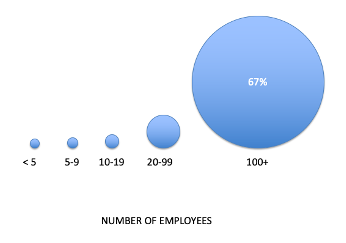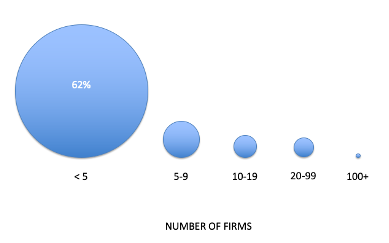Understanding the Paradox that is Small Business
How is it possible that 67% of all Americans work in only 1.9% of the companies in the US? Companies with 100 or more people employ 86 million people in the US. This equates to 112,497 firms out of 6 million. Think about this for a minute - 98.1% of all firms employ less than 100 workers. This collectively only represents 33% of our working population. Everyone else works in big business (over 100 employees). This pattern is consistent across geographies and population levels
Here in Nebraska, the percentage of big business workers is 64%. We have a higher number of big businesses in 2627 (6%) per capita compared to other states. In California, the startup capital of the world, 65% of people work for big businesses which accounts for 2.6% of the total number of firms.
Does this pattern hold true for startups? Maybe. If we categorize a startup as a firm with less than 5 employees, then in Nebraska the number of startup employees is 5% of the total number of employees. In California, the percentage is the same – 5%. The raw employee numbers are different – 41,525 compared to 5.9 million, but so is the size of the total population. And yet, the pattern is still the same.
Small Business Pattern of Regularity
To me, this is fascinating because it is both comforting and unnerving at the same time. I find comfort that there is a pattern of regularity to the growth and development of companies because our firm is in the business of measuring growth. Knowing this pattern exists provides our firm with unique knowledge and advantage to help cities and firms scale strategically. However, I am unnerved by the size of this challenge.
Two out of three people in the country work for big business – universities, state governments, insurance companies, federal governments, TSA, banks, grocery stores, local schools, hospitals, utilities, the military, and the list goes on. Many of these institutions are built on recurring services that will never go away because we need them. For example, hospitals - people will always get sick. Schools – people will always need education. Grocery stores – people will always need food. Insurance is required by law and so is the TSA. Banks keep your money safe and the government exists to build roads and pick up trash. The military provides protection throughout the word. I would add Google, Microsoft, Amazon, Verizon, and Apple into companies that are entrenched in our society. Computers, software, the internet, and mobile phones are not luxury items anymore - they are necessities. The jobs at these companies are not going anywhere because their customers do not have other options. Two-thirds of the jobs in the US are not going anywhere and thus there isn’t any reason to change the current business environment for entrepreneurs for the better because it only impacts 1/3 of the working population of which startups only make up 5%. The challenge lies in changing our current level of understanding about the problem.
“Imagine if the numbers were reversed and two-thirds of the population all worked for startups? Would we be better off? Would we be more innovative? Would life be more equitable?”
The problem lies in determining what is real and what is fiction. The notion that small businesses make up 99% of all companies is true but misleading. The SBA defines small businesses as less than 500 employees. This is misleading because there is a significant difference between the payroll and revenue of a business that employs 100 people and 499 people. What if these were wedding guests? Which wedding would you rather pay for? By changing the small business definition to 100 people or less, we only lose 1.4% (99.5% to 98.1%) of the total number of small businesses, but we add 14% of the employee count to the big business category (53% to 67%). So, while 47% of Americans currently think they work for small businesses, the number is closer to 33%.
Startup or Small Business?
A second misnomer is that firms with less than 5 employees are startups. Many of these firms are independent contractors and doctors’ offices that have been in business for years. In Nebraska, we do not have 25,582 startups as the SBA data suggests. In fact, we have far less. Just how many do we have is a good question and it depends on our definition. We don’t currently have a great measurement for new small businesses and startups and the ones we do have are not current. The data in this blog is from 2017. We need better more current measures to improve our understanding and we need a consistent definition that is not misleading.
Imagine if the numbers were reversed and two-thirds of the population all worked for startups? Would we be better off? Would we be more innovative? Would life be more equitable? I do not have answers to these questions, but I know there would definitely be more start-up t-shirts.


